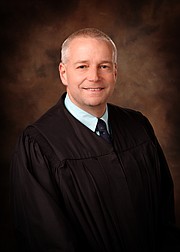Mitchell, Pierce clash over specialty courts
Judge John Mitchell and challenger Douglas Pierce sparred over specialty courts in a forum presented Friday afternoon by the Kootenai County Democrats.
Mitchell, who serves in the First District Court, touted the benefits of the mental health court, which he started 14 years ago.
“My obligation under Idaho Supreme Court law is that I have to protect the public. That’s our most important goal,” Mitchell said. “My philosophy is, especially with crimes of addiction, that the best way to protect the public is to change behavior.”
Pierce, a veteran trial lawyer, argued that issues dealt with by specialty courts, like the mental health court, should be handled outside the courthouse.
“The American Bar Association has issued a warning saying that a judge in charge of a specialty court — DUI court, mental health court, drug court — needs to be cautious,” Pierce said. “They are the judge, they are not a counselor.”
Mitchell said the mental health court — for which he receives no pay or reduction in caseload — makes financial and moral sense.
“I can throw a meth addict in the state penitentiary for up to seven years,” Mitchell said. “In seven years when they get out, they’re still going to be an addict. They haven’t been treated, and it’s going to cost taxpayers $350,000.”
Pierce countered by saying that judges should allow other employees of the criminal justice system, including probation officers, to do their jobs.
“We have a marvelous probation department here in Kootenai County, and all of North Idaho,” Pierce said. “If the facts of what happened merit the person being put on probation, then they should be put on probation. Let the probation officers do their job and make sure that the community is kept safe.”
However, Mitchell remained steadfast that his mental health court was a superior and necessary alternative.
“If I put somebody on probation for two to five years and drug test them and make them go to treatment and make them get a job — and I can do that in a verifiable way with supervised probation — that’s what I ought to do.”
The two candidates did agree, though, when asked by an audience member about their feelings on the creation of a specialty veterans court.
“It would be nice, I guess, if the men and women who served our country and came back with issues specific to their service, if they could get a specialty court of their own,” Pierce said. “I don’t know who would pay for that.”
Mitchell went further, saying that a specialty court for veterans should be created and could be done at no cost.
“We have a magistrate judge who’s willing to do it right now,” Mitchell said. “You don’t need any money to do it. In 2004 I started our mental health court with no money. Judge [Barbara] Buchanan in Sandpoint is starting their mental health court next month with no money.”
In his pitch to voters, Pierce said his vast experience and willingness to learn would suit him well to perform his duties as judge.
“I was a high school teacher — I have my master’s in education,” Pierce said. “I will learn what I need to learn while I’m on the bench.”
Conversely, Mitchell reminded voters of his leadership and experience during his 16 years, and said he wasn’t afraid to buck the norm.
“There is a static desire to not rock the boat,” Mitchell said. “I’m not programmed that way. If you’re not going to do your job, and I’m a witness to it and your client is having their liberty or livelihood affected, I will tell you about it.”
Prior to Mitchell and Pierce’s forum, Rebecca Schroeder, a Democrat from Coeur d’Alene running for the Idaho House of Representatives in District 4, Seat A, urged the roughly 50 people in attendance to remain politically active through November.
Christina McNeil, a Democrat from Boise running for Congress in District 1, asked attendees for their support in this month’s primary and said she would bring their voices to the table in Congress.
The Democratic and Republican primary elections and the nonpartisan judge election take place May 15.



